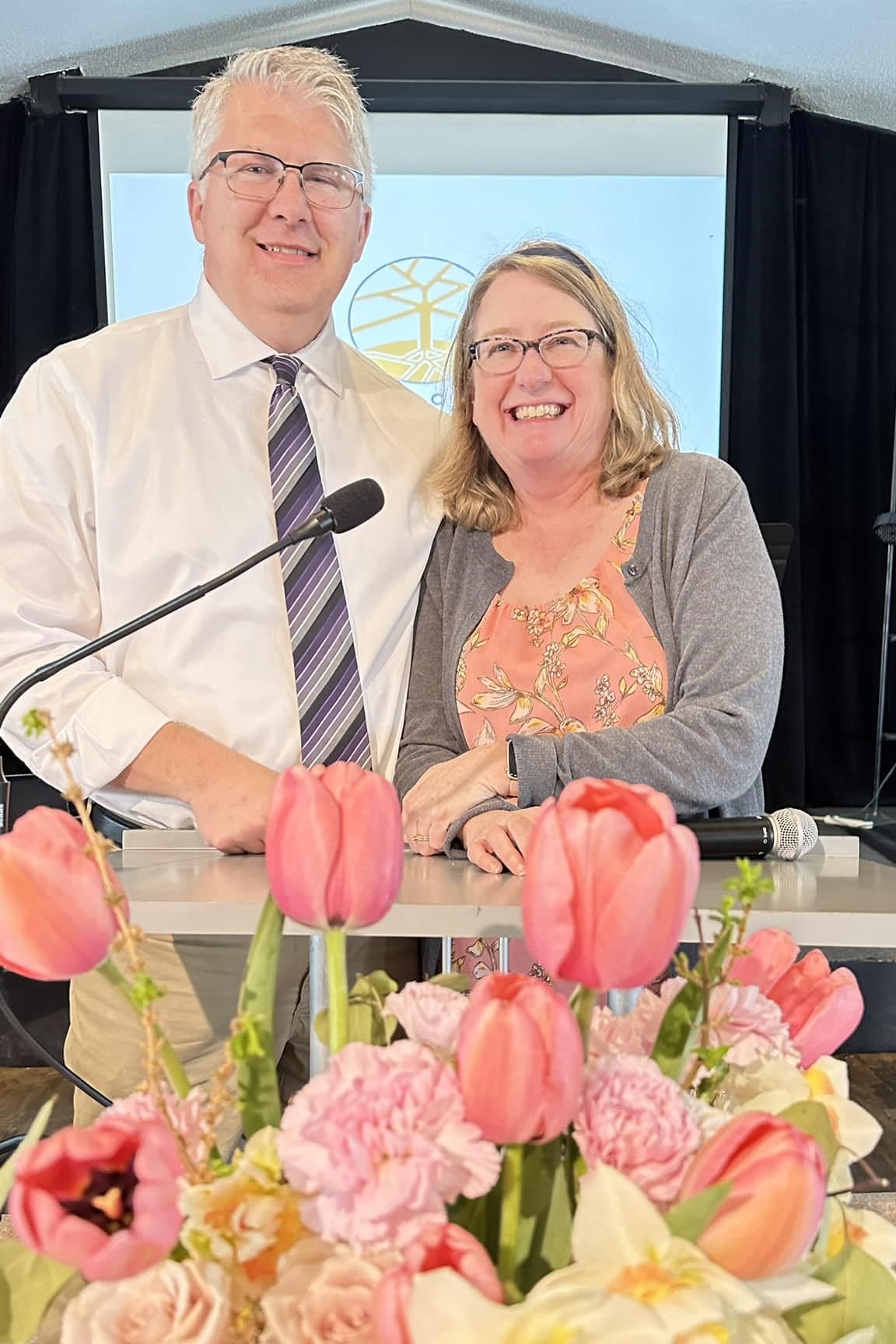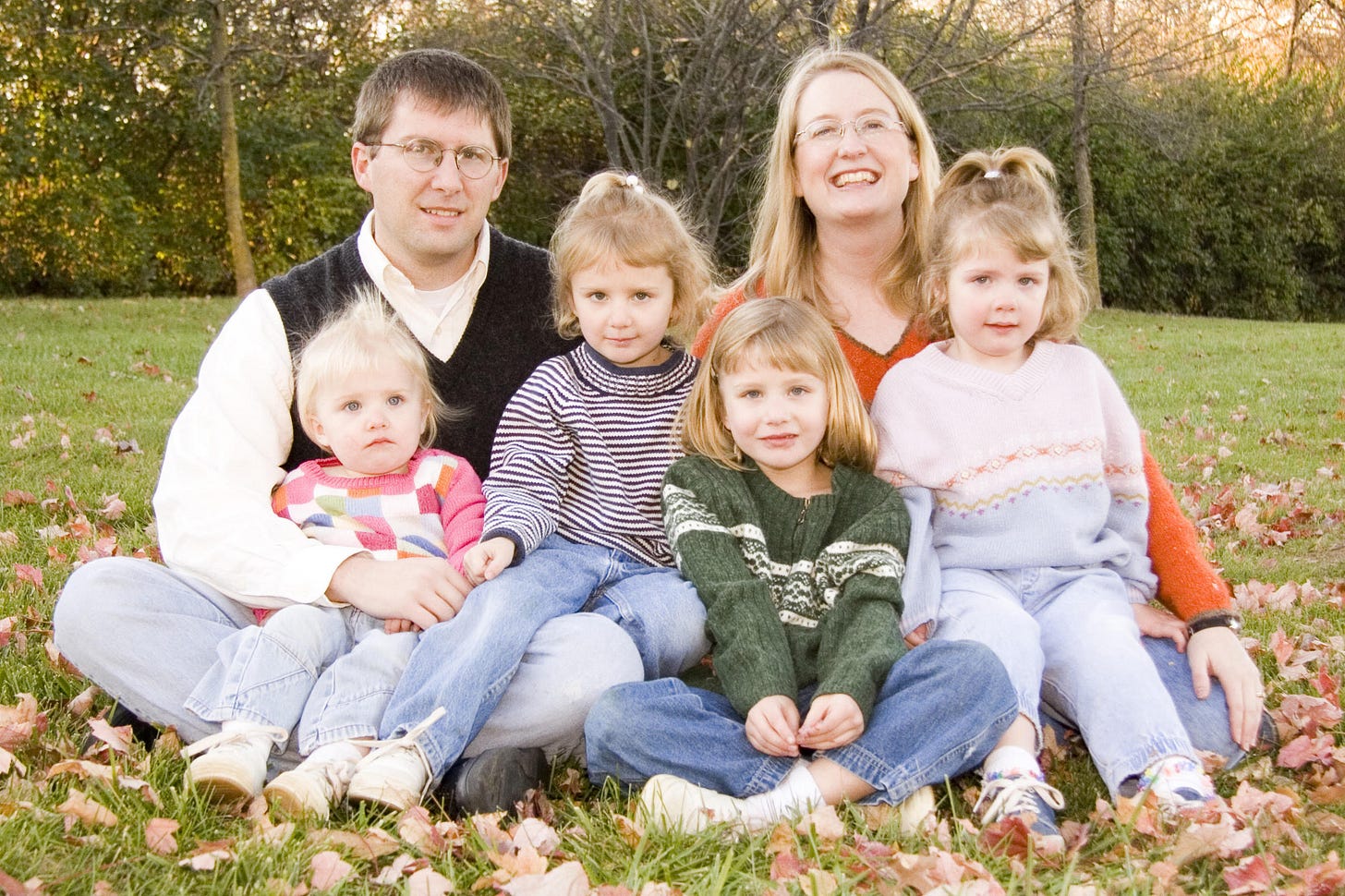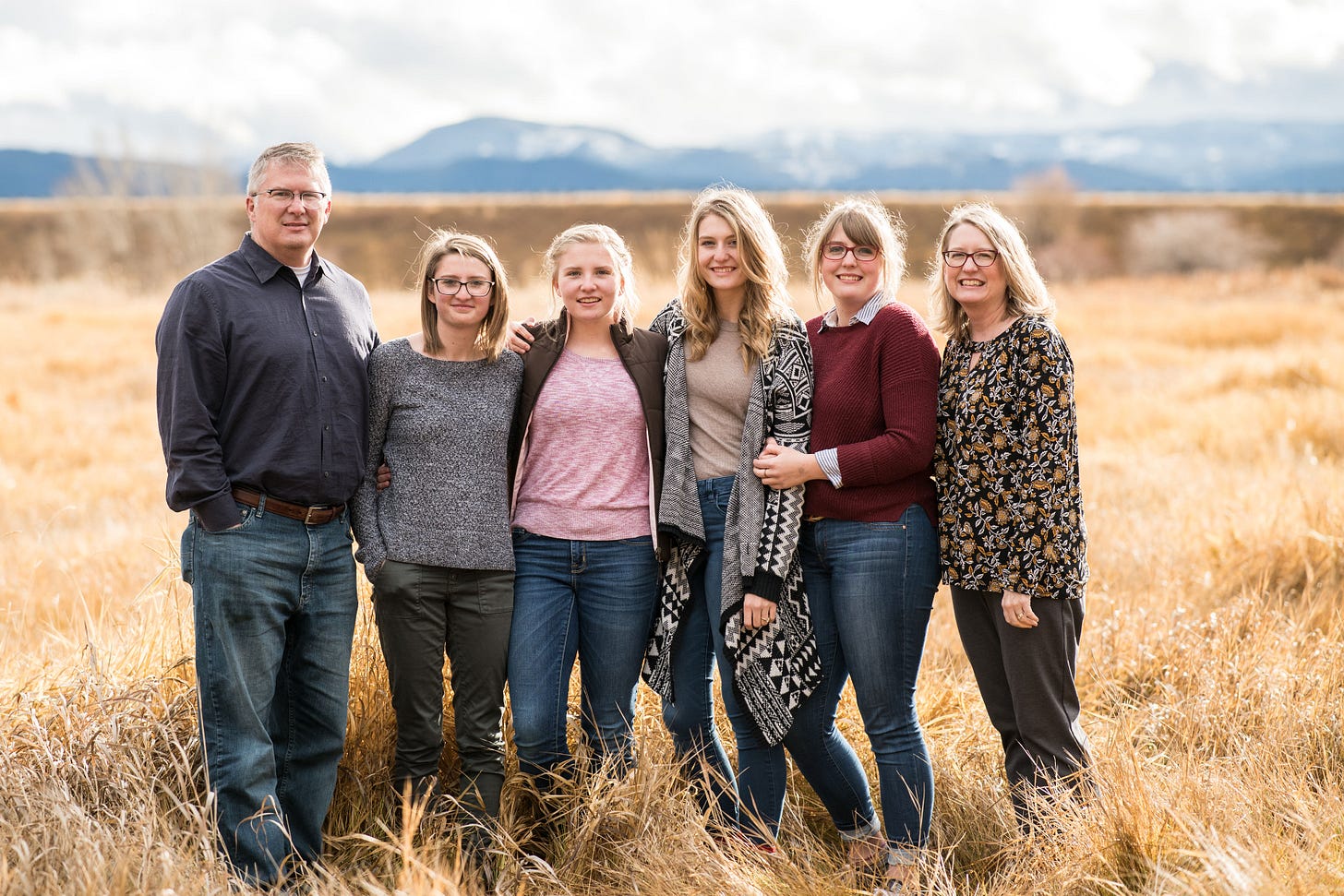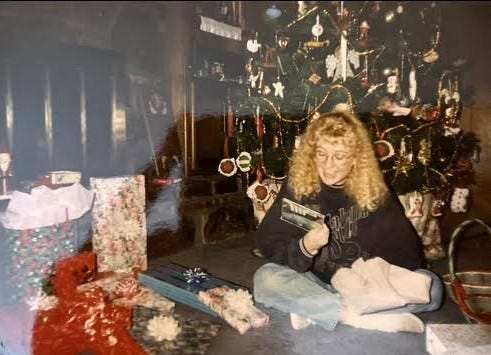Do the Next Thing
Midlife in the Midwest, and Megan's Answer to "How Are You Liking Springfield?"
Dear Readers,
It feels too long since last month’s newsletter, as it’s been five weeks instead of the usual four due to the way the Fridays have fallen. I miss writing more frequently but hope these missives still find their way to you. You’ll be happy to know that Megan wrote the feature this month, so enjoy reading her words and hearing her heart about what God is teaching her.
This past Easter Sunday was both very full and very meaningful as we celebrated the resurrection of Christ. After enjoying good time with our family at Exodus Church, we drove an hour west to be with my family in Pike County for what had to be the first Illinois Easter gathering Megan and I have been able to attend in at least a decade. We then stayed the night at the farm and enjoyed a Midwestern rainstorm most of Monday before making the drive back to Springfield. It was good to be home.

Ordination Update
In the Presbyterian Church in America, ordination is “the authoritative admission of one called to an office in the Church of God” (BCO 17-2). This is the goal I have been pursuing at Exodus Church, and as some have asked, here’s a brief ordination update:
I’ve sat for two of five ordination exams: the first being a four-and-a-half hour test over general Bible knowledge, the second being a six-and-a-half hour test over Theology
I’m scheduled to sit for my third exam (over the PCA’s Book of Church Order) this coming Tuesday, so this weekend promises to be filled with a lot of studying
Next Sunday, April 14, I’m preaching at Exodus on Jesus’ Parable of the Two Debtors (Luke 7:36-50), which will be my third time preaching; pray I rightly divide God’s Word
Sometime the following week (still TBD), I’ll be examined by our presbytery’s Credentials Committee and, if all goes accordingly to plan, will be approved to preach for licensure at the presbytery’s spring meeting in mid-May
After 18 months since this pursuit began, this summer I’ll preach three Sundays a month—four times at Exodus and once each at 7-8 PCA churches in central and northern Illinois. Come August, I’ll study and sit for my two final ordination exams; then, Lord willing, I hope to be examined and approved for ordination in the PCA this coming September.
During this time, so many of you have written cheerful notes, called with words of encouragement, and/or financially supported this ordination quest. Megan and I are grateful beyond words for your love and care for us, and we just wanted to again say thank you for being in our corner. In so many ways, we couldn’t have made it this far without you.
We love hearing from you if you care to write. Thanks (as always) for reading Second Drafts.
Craig (for Megan)
PS: Our kids (and grandkid!) are all doing well in their respective places and pursuits across the country. We miss them and thank you for praying for them if/as you do for us (as Chloe just sent out her newsletter earlier this week, we’re glad to pass it along to you here).
PPS: We were recent unsponsored (but enthusiastic) endorsers of our friends Charlie Peacock and Andi Ashworth’s new book, Why Everything That Doesn't Matter, Matters So Much. We’re confident the inclusion of our thumbs up pic with the book sold tens of copies, but on the chance it didn’t, we encourage you to buy your copy here.
Do the Next Thing: A Guest Post from Megan
(As I did last July, I asked Megan to write a guest post for this month’s Second Drafts. On Spring Break and currently visiting her father in Tulsa, she always writes with an honest heart and voice that many appreciate. If you’d like to contact her after reading, you can do so here.)
“How are you liking Springfield?”
It’s a reasonable question, one I still get asked on the regular, even though we’ve lived here for (almost) a year. Its close cousins include, “Do you feel settled yet?”, “Have you found some favorite places to go in town?”, and the less specific (but always suspect, at least to me), “How are you?”
All of these are caring enough inquiries coming from people’s hearts, and we all know the “How are you?” question isn’t really meant to be answered (though I do like the Norwegian response, “Up and not crying”), but there’s no easy 20-second honest response I can give. I know others don’t mean it to be, but “How are you finding Springfield?” is a loaded question, the answer to which requires some unpacking.
A Big Small Town
When we made our first major move from Colorado Springs to St. Louis almost twenty years ago, I was excited about it. There was an allure to the idea of seminary life at Covenant that appealed to then-32-year-old me. I was going to try for an MA in Theological Studies (as a spouse, it would be free!), homeschool the girls (then 6, 5, 3, and 2), and become the next Edith Schaeffer. All would then be right in my world.
Except that it wasn’t. Don’t get me wrong: life was good, but it was still hard. Squeezing six people into a campus apartment, living on a shoestring budget, starting over and finding friends and a church—hard, hard, hard. Studying didn’t come as easily for the older me with four children as it did when I was a younger me with no other responsibilities. I made a C in my first seminary class. This was my third C ever, the first being 9th grade Biology and the second being an extremely hard Textiles and Design class in college. Contrary to the popular mantra of the day, I did NOT subscribe to “C’s get degrees.” I was an “A” kind of gal; anything less was failure.
All this pressure culminated one day when, while I was working on a paper and “watching” my girls on the seminary playground, two-year-old Millie came over, stood in front of me, and with her piercing blue eyes, quietly placed a ball on top of my laptop keyboard.
Message received. This was not the right time for me to further my education. I had set myself on a path of raising children and needed to recommit to it. I finished the semester, let go of the MA idea (though God in His providence was kind, allowing me to earn a graduate certificate later), and never looked back. Onward and upward!
During that time, I came to another hard realization: making friends does not come easily for me. Somewhere deep inside I already knew that, but I had been in a Christian camp community in which it seemed more natural to find kindred spirits. It took six solid years to find “my people” in St. Louis, but once I finally did, we moved.
Many of you know aspects of our story, at least geographically: Colorado Springs to St. Louis; St. Louis to Oklahoma City; OKC to Bozeman; Bozeman to Springfield. What you may or may not know is I tend to be one to grieve what is yet to happen. So, with our move to Bozeman came a pre-sadness that this would be the last place our family would all be together as the girls were 16, 15, 13, and 12. I anticipated the pain that was coming even before I knew the exact set of processes it would take happened.
But sure enough, it happened: three years later, Maddie graduated, moved out on her own, and then got married. Then Chloe moved out. Then Millie moved away. Then Chloe moved away. Then Katie moved away. Then Chloe got married. Then Craig and I moved away. Then Katie got married. Then Maddie had a baby.
Now none of us is even in the same state anymore! That course of motherhood I recommitted to back in 2006 when the ball landed on my keyboard? Hard stop, at least to the “in-person” kind.
Thus, answering the “How are you liking Springfield?” question is so much more complicated than listing amenities or drawbacks of this particular “big small town” in central Illinois. In truth, it is more tied to “How are you liking this particular stage of your life?” And the honest answer to that question is, “I’m not, at least not all of it.”
Identity Is Not Role
Make no mistake, I am grateful for our girls and who they are, for the paths they are all walking along with God, and for the men God has graciously placed by their sides to lead and walk with them. But I feel like I share, in a very weird sense, something in common with Lord Voldemort of Harry Potter fame; that is, my soul feels split in a myriad of ways—in my case, between Illinois, Montana, Virginia, New Mexico, Georgia, and Oklahoma. So, with my soul feeling split, so, too, does my identity.
Growing up outside of Tulsa, OK, all I ever wanted to be was a stay-at-home mom. I had one primary goal at the time: get married to a guy who loved the Lord and have a lot of kids who also loved the Lord. In my Bill Gothard-inspired context (which I do not recommend), I would have loved it if said guy was a Baptist preacher and our life with seven boys on a farm lent itself to my romanticized and modernized Anne of Green Gables ideal.
My favorite classes in high school were Home Economics I and II, so I went to college (because that’s what one did) to become a Home Economics teacher. When Oklahoma State dissolved that degree program midway through my sophomore year, I ended up in Early Childhood Education, which was fine, but I never intended to become a teacher in a formal, employable sense. Craig and I married one week after I graduated, and two years later, Maddie was born. Voila! I was officially a mom just getting started on my dream of doing full-blown “mom” things.
It’s easy to cast a nostalgic glow over those early years and forget some of the real challenges of raising young kids. It might even be a grace that we don’t remember all the difficulties of six sinful humans sharing space together for so long. There are definitely things I did/didn’t do that I would go back and redo if I could, and for those I have remembered, I have apologized to my kids. But I did love that life and have never regretted staying home with our girls and homeschooling for as long as we did.
What I do have regrets about is equating my identity with my role in such a significant way. Granted, it is understandable and natural, but for so long, who I was was what I did. Now that we’ve moved to a place where NOBODY knows my kids (or me as their mother—a title that had been my primary identifier), I’m having to adjust.
Good news: I’m learning the importance of doing so. Other news: I don’t like it.
Acronyms & Calling
I have ADHD, RSD, and am non-clinically depressed. I know these things because I spend a fairly non-healthy amount of time on Instagram and I’m pretty good at mining memes that get right to the heart of things.
For real, though, about four years ago, I started doing some self-study on ADHD on behalf of a student who needed significant help. During my research, I had a moment of self-realization. Those things I was looking into? They described me. And they have for as long back as I can reasonably remember.
I decided to go to the doctor and see how a more medicated life might feel. Here’s what I discovered: I’m extremely bad at remembering to take pills. It’s funny, right? These are supposedly highly-addictive solutions and as such, highly-regulated, yet the people they are designed to help most can’t remember to even take the silly things and won’t call the doctor to schedule a follow up visit (they are also very expensive).
Did they help? Some, but not SO MUCH that it made sense financially to continue. Somehow I’ve made it this far and am still alive. Do I drink more than my fair share of coffee? Maybe. Do I “give-a-mouse-a-cookie” my way through the bulk of my day? Ahem. Have I recently developed a propensity for closing kitchen drawers only half way and not even realizing it? Ask Craig (he has photo proof).
Knowing this about me now helps better frame some of my responses to life in the past, particularly as they relate to the concepts of “calling” and “gifting.” I remember being taught the perspective that there is a Samuel-esque calling given to every individual, along with a “next steps” prescriptive outline. But fast-forward 30 years and I’ll tell you that this is a hard mindset to deviate from, especially when your actual life doesn’t follow what you thought was your calling’s next-steps script.
We Are Not Our Roles
I wonder if what might be more true about calling is that it’s not nearly as specific as we in our modern, occupation-obsessed culture tend to think it is? I wonder if maybe we confuse it with gifting? Can I have a bent toward teaching and not necessarily be called to teach elementary kids at a specific school? Can I naturally lean toward roles of service and not be called specifically to making coffee for the church every Sunday?
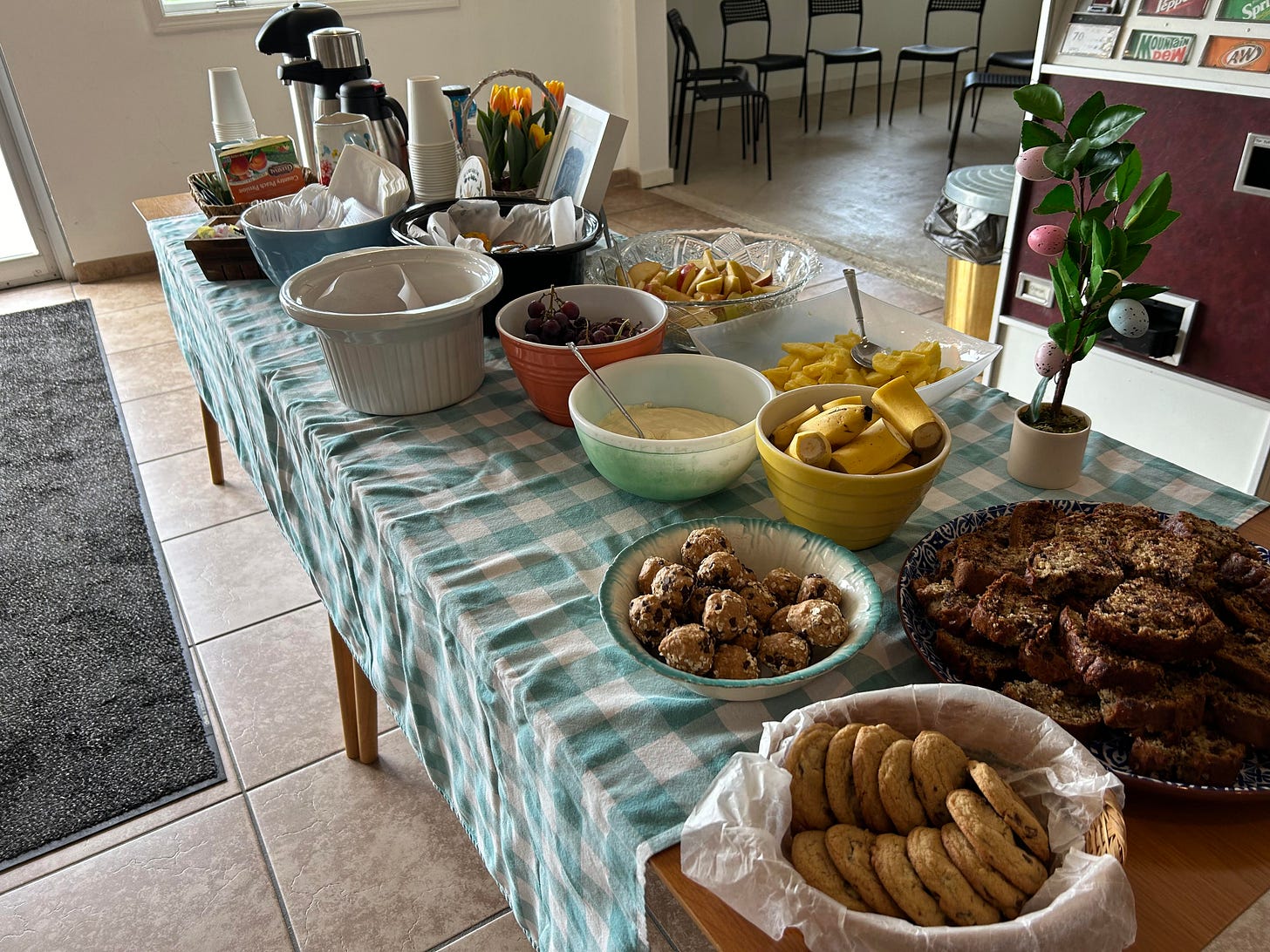
Could it be that acts of teaching 2nd graders at Springfield Christian School and prepping and setting up coffee every week at Exodus come under the general calling to love God and love people as Jesus outlines in Matthew 22:36-38? I think yes. But, if I end up no longer doing either of those specific things, it shouldn’t affect or negate my identity. Those are roles and tasks; they are not the total of all who I am.
There’s a lot of freedom (and dare I say it—relief) in no longer believing that my role is my calling. This is important, because if I try to tie calling and role together more tightly than is healthy, when roles change—as they did more drastically for Craig; as they have for me more progressively now—it’s a lot easier to take. Our friend Michael Card says, “We are not our gifts.” I would take it even further: “We are not our roles.”
To illustrate, if I believed that I was specifically “called” to teach 1st graders at a classical Christian school in Montana, but am now teaching 2nd graders at a non-classical Christian school in Illinois, I would flounder because of the discrepancy. If I thought my calling was to raise children who can read, love the Lord, and love each other, what happens when those children grow into adults and no longer need me in the same way? Has my motherhood calling changed, or is the role just different?

In 1 Thessalonians 5:16-18, the Apostle Paul writes:
“Rejoice always, pray without ceasing, give thanks in all circumstances; for this is the will of God in Christ Jesus for you.”
What if that’s it? What if that’s all that “calling”—God’s will—really is? If I’m trying to make things too simple, forgive me, but know I’m not the first. Augustine wrote:
“Love God and do whatever you please: for the soul trained in love to God will do nothing to offend the One who is Beloved.”
If I tie my calling to my role too tightly, if that role is removed…or changes…or (gulp) ends, life might feel like a concession, like a “Plan B.” But I know (and on my better days, believe) God doesn’t use “Plan B” language, because He is a sovereign God Who doesn’t have need for one. It’s hard to read Ephesians 1-2 and think otherwise.
In Christ Alone
I semi-joked above that I am non-clinically depressed. In truth, I have struggled with depression in response to significant sorrows in our story the past 10 years. But do those sorrows stem from a change in calling or from an unexpected redefinition of my role? By and large, it is the latter, not the former.
When my mother died from ALS in 2014, I experienced what Michael Card wrote in his song, “The Silence of God”:
“It’ll drive a man crazy, it’ll break a man’s faith
It’s enough to make him wonder if he’s ever been sane
When he’s bleating for comfort from Thy staff and Thy rod
And the heavens’ only answer is the silence of God”
This was my first experience with a primary relationship permanently changing and I struggled to change with it. I was still Moleta’s child, but the role was different now.

When we moved to Bozeman in 2015, my role as a part-time homeschooler ended (this was after it already had been changed from a full-time homeschooler in our move from St. Louis to Oklahoma City in 2011). When we arrived in Montana, I went to work for a non-profit, then for Target, before eventually becoming a full-time, five-day/week teacher, none of which (even the teaching position, at least initially) I had aspirations for. Again, the role changed (a couple times).
In each case, yes, my role changed, but my calling to love God and love people didn’t. Why did I allow my identity to be defined by what I did rather than by who I was (or, more helpfully, Whose I was)? Paul’s words from 1 Corinthians 6:19-20 comes to mind: “You are not your own; you were bought at a price.” Why did I allow my worth—my price—to be tied to a role rather than to my relationship with my Heavenly Father?
I remember the initial, pivotal moment when I first read Edith Schaeffer’s Common Sense Christian Living. Even now, I feel the need to re-read that book, but I remember very clearly realizing for maybe the first time that life isn’t compartmentalized into “Christian-you” and “Everything-else-you” (my paraphrase). Everything about our life and work is infused with Christ; He is all and He is in all.
I’m trying to revisit this idea in light of where Craig and I are now here in Springfield. No, Illinois does not have mountains like Montana or Colorado, nor is Springfield as big or fun a city as St. Louis, but I love not dealing with snow for eight months out of the year and that we can afford our house. I think I’ve somehow attached the Lord’s presence to “past-us” because of what we did instead of to “now-us,” falsely believing that this current moment in time is separate from past leading of the Lord.
But if Christ is all and in all, I have to believe He persists in His plan—past, present, and future—for us, in this season of life, without our girls, without our old friends, without our old roles. Springfield is not God’s Plan B, but rather God’s Plan A continuation of our story. And our story, of course, is really His story in which our worth still doesn’t come from what we do, but from Him to whom we belong.

Of the modern choruses, this song I learned when we were at seminary is a favorite:
“In Christ alone, my hope is found
He is my light, my strength, my song
This Cornerstone, this solid ground
Firm through the fiercest drought and storm
What heights of love, what depths of peace
When fears are stilled, when striving cease
My Comforter, my All in All
Here in the love of Christ I standIn Christ alone, who took on flesh
Fullness of God in helpless babe
The gift of love and righteousness
Scorned by the ones He came to save
‘Til on that cross as Jesus died
The wrath of God was satisfied
For every sin on Him was laid
Here in the death of Christ I liveThere in the ground His body lay
Light of the world by darkness laid
Then bursting forth in glorious Day
Up from the grave He rose again
And as He stands in victory
Sin’s curse has lost is grip on me
For I am His and He is mine
Bought with the precious blood of ChristNo guilt in life, no fear in death
This is the power of Christ in me
From life's first cry to final breath
Jesus commands my destiny
No power of hell, no scheme of man
Can ever pluck me from His hand
Till He returns or calls me home
Here in the power of Christ I’ll stand”
Do the Next Thing
What this practically looks like for me can be summed up in an old poem made semi-famous by Elisabeth Elliot as she processed her next steps after her husband, Jim, had been martyred on the mission field. In a phrase, she decided to “do the next thing.”
“From an old English parsonage down by the sea
There came in the twilight a message to me;
Its quaint Saxon legend, deeply engraven,
Hath, it seems to me, teaching from Heaven.
And on through the doors the quiet words ring
Like a low inspiration: do the next thing.Many a questioning, many a fear,
Many a doubt, hath its quieting here.
Moment by moment, let down from Heaven,
Time, opportunity, and guidance are given.
Fear not tomorrows, child of the King,
Trust them with Jesus, do the next thing.Do it immediately, do it with prayer;
Do it reliantly, casting all care;
Do it with reverence, tracing His hand
Who placed it before thee with earnest command.
Stayed on Omnipotence, safe ‘neath His wing,
Leave all results, do the next thing.Looking for Jesus, ever serener,
Working or suffering, be thy demeanor;
In His dear presence, the rest of His calm,
The light of His countenance be thy psalm,
Strong in His faithfulness, praise and sing.
Then, as He beckons thee, do the next thing.”
Doing the next thing for me—in my current context and embracing my call to love God and love others—involves:
Preparing and showing up to teach the 21 kids I’ve been entrusted with each school day this year
Co-teaching our children’s discipleship class with our church’s K4-4th graders
Praying for my family and visiting them as often as I can and as the budget allows
Trying to more effectively close the kitchen drawers
Beginning this summer, I plan to go through training to become a Certified Dyslexia Practitioner. This fall, I plan to continue showing up at the same school for a new set of 2nd grade students, as well as co-teaching our young Exodus kids from God’s Word.
Throughout, I hope to keep praying for and visiting my family whenever possible, and (maybe) I’ll master closing the kitchen drawers. I hope to do all this with greater security in understanding my worth comes not from what I do, but from Whose I am.
So, “How are you liking Springfield?”
As God and His grace work in my life, I think it’s growing on me.
Craig and Megan Dunham live in Springfield, IL, where Craig serves as Ministry Coordinator at Exodus Church and Megan teaches 2nd grade at Springfield Christian School. Please consider becoming part of their support team (all gifts tax-deductible).
Know someone interested in the Dunhams’ ministry in Springfield? Share it!
Want to contact the Dunhams? Email either or both: Craig and Megan.


